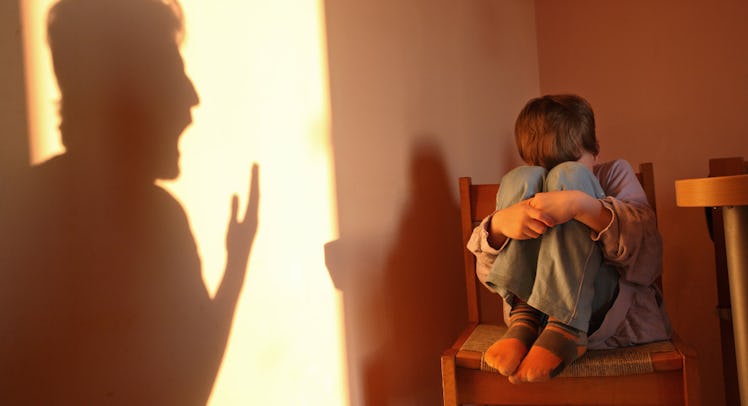6 Myths About What Happens When Dad Yells
Myth #1: Yelling affects them as adults.

The yell is loud, angry, and frightening. It’s also a fairly natural reaction to a perceived threat. For kids, yelling can be both bad (“Shut up!”) and good (“Shut the tiger cage!), but it’s always notable. Children react strongly to parental emotion because yelling is such a visceral display of either concern or anger, it pulls kids’ attention instantly. No wonder parents obsess over yelling, and no wonder there are so many questionable bits of accepted wisdom about raised voices.
“I would call them all excuses to explain the behavior we’re going to be doing anyway,” says child psychiatrist Kyle Pruett, M.D., author of Partnership Parenting, who dismisses the idea of the non-yelling parent as a fiction.
Here are the lessons parents are taught about yelling that may not be true at all.
Myth #1: Yelling Affects Them As Adults
“It depends on the temperament of the child,” says Pruett. He notes that shy children who are bewildered by social aggression will likely hold onto those moments of yelling much longer. But that won’t be true for feisty or autonomous kids.
And for those who think they may have done long-lasting damage by yelling, Pruett offers some insight. “That’s a somewhat narcissistic view of parenting. Because there are tons of other forces at work, including their own neural-developmental progress.”
Which would also suggest there’s never a bad time to stop bellowing at your kid. Their brain will still be building and rearranging itself well into their 20s.
Myth #2: It’s The Only Way They Know An Adult Is Mad
Turns out that humans have tons of nonverbal indicators for anger. Most of them are worn on the face. Anger comes with furrowed brows, narrowed eyes, red skin, frown lines, and a mouth turned down at the corners.
“Children are really excellent readers of our emotions,” Pruett says. “In an interesting way, it’s one of the things that keeps them alive.”
Babies endear themselves to their parents by reacting appropriately to emotional stimuli. They don’t actually need any auditory signaling to understand that you’re about to lose your mind. They get it.
Myth #3: Yelling Is A Dangerous Impulse
When a kid is in danger, parents have a very hard time refraining from yelling. That’s as it should be. The autonomic nervous system is kicking in — the one that once helped help humans fight bears or run from slathering, saber-toothed cats. So seeing a kid in imminent danger is no time to suddenly find calm. “It’s probably a good idea to get a little wild in those moments,” says Pruett.
The yelling reflex saves live, but a reflex is a reflex; it’s going to pop up at less-than-ideal or inappropriate moments. That’s the downside of a useful tool.
Myth #4: Kids Listen When Parents Yell
There is a clear difference between listening and hearing. When a parent yells, their kid will probably hear them, but it’s unlikely they’ll be doing much listening. True, a kid might stop what they’re doing out of fear, but they’re not actually absorbing information.
“It doesn’t make your children listen better. It does exactly the opposite,” Pruett explains. “It teaches them to fear you.”
Some might think that fearing is a good thing because it gives the parent a sense of authority. But it does just the opposite. Fear erodes trust. And with the erosion of trust comes the erosion of credibility and the tendency to avoid interactions. The result? Children who actively minimize the amount of time they spend interacting with their parents.
If you really want a kid to listen, doing the opposite of yelling is a better bet. “Drop a knee. Eye contact and whisper,” says Pruett. “Which is exactly the opposite of what your body is telling you.”
Myth #5: It Toughens Them Up
“There’s no evidence to support this whatsoever,” says Pruett. “It’s just like spanking.”
Yelling, like corporal punishment, does not have any effect on a child’s moral compass. What it does do is prime a kid to be more aggressive with other people and work harder to not get caught.
Myth #6: It’s the Same For Both Parents
Yelling turns out to be a pretty gendered issue. It’s not that moms don’t yell; it’s that fathers yell with more force. “Just like they can throw a ball harder in most cases,” says Pruett. “Because of testosterone, fathers need to work on this more consciously than mothers.”
Because when a parent yells, explains Pruett, their whole body is flooded with stress hormones and engaged in hurling their voice as forcefully as possible. Add a dash of testosterone, and that voice can be extra scary for a kid. “That’s not going to help them in their future relationship with their boss,” he says.
This article was originally published on